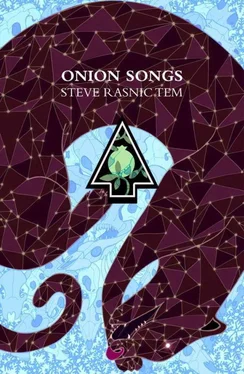Steve Rasnic Tem
ONION SONGS
Only as the changes unwound toward a kind of conclusion did I realize they’d begun much earlier than that weekend of peeling sunburn almost ten years ago. It’s possible, I suppose, that these startling transformations began immediately after my birth, and that my life has been a slow series of reveals leading up to some final truth, some ultimate me.
Of course these revelations have been subtle, otherwise I would have noticed them right away. An overnight change in the texture of my hair, the way it lay against my scalp, or a new highlight when I looked at myself in the mirror, may have in fact been because the fuzz native to another creature had manifested itself in my scalp without my knowledge and blended in with my own.
Or a difference in the way I walked, shook someone’s hand, and mounted a chair at meals may have indicated that some ancient, time-released gene of alternative movement had finally made its effects known. Sometimes awkwardness made me appear barely in control of my own muscular and skeletal systems. Is it possible such awkwardness came not out of a congenital incoordination but out of attempts to control an alien nervous system?
From time to time I would recognize that the images in my dreams were obviously from someone else’s life, but I was always reticent to complain, neither did I recognize that there was anyone I could safely complain to.
These were some of the seemingly ordinary sensations I noticed from my early experiences in the world. But it was only after I had reached my fiftieth birthday, and fell asleep on the beach during that disastrous vacation in Mexico, that I realized their true significance.
I woke up with my wife Janet crouching over me. “Harry, get up! You fell asleep—you’re going to have a terrible burn!” She wore so much lipstick her lips looked like two bloody flaps of skin. I raised myself on my elbows to get a better look at her. No, this wasn’t my wife at all, not any wife I would ever have had. “Janet?” I said.
“Janet? Who’s Janet? What’s wrong with you? It’s Betty!”
Betty’s hair was perfectly black. Obviously she’d colored out the gray streaks. My wife Janet had beautiful gray ribbons of hair woven throughout her imperfectly balanced hairdo.
“I’m sorry,” I said, quickly getting to my feet. “I’ve mistaken you for someone else.”
“Harry? Lie back down. You got too much heat, Harry. It’s Betty—just listen to me.”
But I couldn’t lie down—I had to go find Janet. “I’m sorry,” I said. “But I don’t know you.”
“Harry, we’ve been married over thirty years!”
I started running down the beach. But before I got very far I fainted. At least I think that’s what happened. All I remember is my face hitting the sand at a high rate of speed, and burning, like an asteroid hitting the sun.
I remember the way my father became old. He had always been an active, vigorous man, much more focused, more determined, than the younger men who surrounded him, who looked up to him. I’m not sure if I ever looked up to him. I was never really able to know him all that well, and I resented it.
Then one day he fell down the concrete steps in front of his house, the house I grew up in, and broke his leg. I remember how he laughed about it. “Always in too much of a hurry,” he’d said. “I’d want to be early to my own funeral,” he’d said.
But the healing had taken a long time, almost a full year. And even after that he never walked properly again—he walked like someone else. And there was something about being forced to slow down like that, having to take it one step at a time instead of two, that changed everything, that seemed to shift him into another stream of time so that he began to lose color, he began to pale, to slowly fill with white, even the scant evidence of his thought processes filling with white, so that when he tried to talk it seemed that all he could talk was nonsense, this white, sleep-inducing noise.
People stopped paying attention to my father—they no longer cared what he had to say. I saw layers of confidence fall away from him, layers of vitality and layers of sense. I don’t know when he quit his job. I’m not sure it was ever even official. He simply stopped going to work. His speech could no longer be heard by normal people, and shortly thereafter he was overcome by a creeping transparency, as his last few layers began to float away like tissue dissolving in sunlight and wind.
But before my father lost the power of audible speech he was constantly murmuring in a sing-song voice. I never could quite understand him—but it was something like, Daddy peel the onions, Momma peel the onions, chop them up, spice them right, feed all the children the onions.
The last time I visited he was like a newborn, shrunken up and asleep on one end of the old couch. He had peeled down to some sort of infancy, but there were no signs of the fresh vitality of the newborn—he was simply the remains of some depleted seed. I spent a few days in the old home place with him, then left having forgotten why I had come in the first place.
After my fall into the hot Mexican sand I woke up in a strange bed. I thought at first I was at the hospital—the bed was stiff and uncomfortable and there was too much white in the room—it hurt my eyes. But I quickly realized it was my own bed in my own house and it was me who had changed.
Betty or Janet came into the room then, carrying a tray with a steaming bowl of something on it. There were also large towels on the tray and a variety of metal instruments. “So, mister-can’t-remember-his-own-wife,” she said with a mocking smile. “Are we feeling better today?”
But I didn’t know how to answer. “We? I don’t understand. I can only speak for myself, and I really have no idea how I’m feeling. I was hoping you could tell me. My memory isn’t what it used to be.”
“I was afraid of that,” the woman who may or may not have been my wife replied. “We’re still not ourselves, are we?”
“No, no, I’m really afraid you’re not,” I replied. “I’m terribly terribly afraid you’re not.”
She put the tray over my lap. I stared down into the large bowl of clear steaming liquid. “Oh, I forgot the salt,” she said. “I’ll be right back.” This disappointed me. I was quite aware that I never wanted her to come back.
I could tell that something had been dissolved in this liquid, but I couldn’t tell what. The steam felt quite soothing against my face. The shiny metal instruments were obviously medical in nature. And the towels looked fluffy, absorbent, and, in their own way, as welcoming as the steam.
I had no idea what was expected of me and this caused me a great deal of anxiety. My face felt dry and itchy. By raising my hands and feeling with my fingers I could tell how very rough it was, how damaged. There were cracks, and here and there the top layer of skin had completely separated from the layers beneath. I remembered how hard I had fallen into the sand, and how much the hot sun had burned my already sunburned skin.
“Onion skin, onion skin, I have such beautiful beautiful onion skin,” I heard myself spontaneously uttering in a sing-song voice.
I picked up the tray and carried it awkwardly from my bed. I was still pretty shaky and congratulated myself for not spilling anything. I carried the tray into the bathroom and set it down over the sink beneath the mirror.
I examined the instruments—they looked vaguely familiar. They were obviously designed for lifting, separating, peeling. A gentle tune issued softly from my throat like a purr. I quickly realized it was the onion song. With an instrument in each hand I raised them to my face intending to debride the dying layers.
Читать дальше












